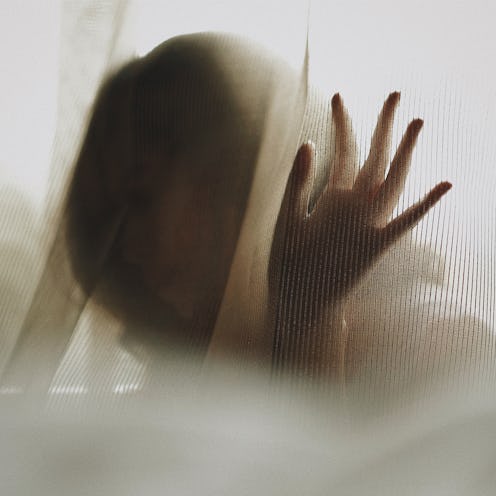Life
If You Feel Like You’re Always Being Watched, There’s A Scientific Reason Why
In the age of pervasive social media, ubiquitous camera use, and actual real-time surveillance, it can feel like you're not just being paranoid, and that you really are being watched. But paranoia in its truest sense isn't necessarily about the creepy feeling of hairs going up on the back of your neck. It's a state of heightened suspicion of constant threat, and it exists on a continuum from reality-based (if a dude seems to be following you home from the bus stop) to delusional (the government are reading your thoughts). Feeling a little paranoia, scientists stress, is normal — and understanding it gives us a lens into how humans have learned to interact and anticipate threats from others.
The word paranoia itself, as you might have guessed, comes from the ancient Greek. But when it shows up in ancient Greek tragedies by the likes of Euripides, it's used as a kind of synonym for "crazy." The modern sense of heightened or excessive awareness of the harmful intentions of others didn't emerge until the 19th century, as German and French doctors refined the concept from a kind of delusion to a specific diagnosis. Paranoia also took on a new dimension in the 20th century as people began to study schizophrenia, which occasionally results in paranoia and hallucinations. But having a sense of paranoia doesn't necessarily mean you should see a mental health care professional, or that you're being haunted: the idea of being wary of others in your environment seems to have developed as a pretty natural part of our survival.
Normal Paranoia Likely Developed To Help Us Survive
Paranoia, it's suggested, likely evolved as an evolutionary strategy. "Wariness of the intentions of others may be adaptive in some situations," noted the British Journal of Psychiatry in 2013, "and becomes a clinical problem only when it is excessive, exaggerated or distressing, or interferes with functioning." So what's the story behind its development under normal circumstances?
The dominant theory is that we experience paranoia because our nervous systems and brains are designed to assess and highlight something called "social threat": the potential signals being given by other people that they may be hostile or not have our best interests at heart. A review of paranoia science in 2004 found that we possess many fine-tuned ways of detecting whether people around us are friendly: we can unconsciously "read" angry and afraid facial expressions very quickly in others, and various parts of our brains buzz with activity as they try to assess whether we should be suspicious. Humans are social animals who have lived and cooperated as groups for a very, very, very long time. As well as being able to work well with others, it stands to reason that we also carry deep-seated mechanisms to help us detect unfriendly intentions and protect ourselves and our groups. "Normal" paranoia, a sense that somebody might be out to get you, is, according to this theory, a product of an evolved threat-detection system, and when that system goes haywire, more extreme paranoia results.
The extent of mild paranoia in the general population gives some insight into how it can actually be practical. A 2013 study of 8580 British people to identify paranoid thoughts found that a full 20-30 percent of the population recorded thoughts that fit on the "normal" end of the paranoid scale, including:
"A consciousness of a lack of assertiveness, worries over social inferiority, worries over criticism by others, feelings that people were generally against the respondent and might use or hurt them, and a reluctance to reveal too much in case people used it in adverse ways. Ideas of reference involving the detection of hidden threats or insults were almost as common. A sixth of the population spent a lot of time wondering whether they could trust their friends or work colleagues."
Most people would regard these as pretty average fears and concerns about the intentions and thoughts of others. As paranoid ideas became more extreme — worries that friends were actively watching them, beliefs that strangers were talking about them, and finally the unshakeable conviction that known or unknown forces were out to hurt them — the number of people who ticked "yes" got smaller and smaller. In those people, evolutionary strategy had given way to a more serious problem.
If you feel like your paranoia has gotten in the way of your day-to-day life, you should speak to a mental health care professional or primary care physician about potential ways to manage it. Otherwise, know that a little bit of paranoia isn't bad for you, and may have helped humans evolve into the way we are. If you feel like someone's always watching you, it may be creepy, but it's (probably) not because you're being haunted.
Check out the entire 'What's Up, Boo?' series and other videos on Facebook and the Bustle app across Apple TV, Roku, and Amazon Fire TV.
